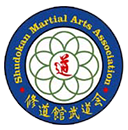An Excerpt From "Budo Mind and Body"
By Suino, NicklausThis article first appeared in the Winter 1996 issue of the "SMAA Newsletter."
What is Real Victory?
Victory, to many martial arts students, means physical triumph over another person: a full-point throw in judo, an uncontested strike with a shinai to a vital area in kendo, or a karate punch that finds its target without being blocked. While these feats do represent a certain kind of victory, one that gives us a short-term sense of superiority over another person, real victory in martial arts is something different.
As in Zen, real victory in budo is mastery of the self--body, mind, and spirit. While defeating an opponent in a match tends to inflate the ego, serious study of budo over a long period of time helps to give one a realistic sense of one's place in society. Training only for fighting or competition teaches valuable lessons in discipline, and is good physical conditioning, but it also exposes the athlete to great risk of injury. The study of traditional budo teaches the same lessons and more, but also provides for the safety of the practitioner, so that progress is not often interrupted by periods of recuperation.
Real budo conditions the body while teaching us to control our limbs, our breathing, and to some extent, the functions of our internal organs. Repetitive practice of fundamental motions allows us to obtain a degree of control over our bodies that few non-martial artists can imagine. Yet there are far more important reasons to become involved in budo.
One of these is mental discipline. Proper training in martial arts can help us to develop greatly heightened powers of observation, especially concerning people and situations. It teaches us orderly thinking habits, which can be useful to us in our education, careers, and relationships. It teaches us mental balance, which makes us happier and more productive. Ultimately, it allows us to achieve a state of direct perception that past masters of budo have called "no-mind," a sort of alert meditation state that helps us become fully immersed in whatever we are doing at a given time.
Through history, legend, and positive example, budo culture provides a host of good influences for us. We are constantly exposed to beneficial ideas, such as the importance of sincerity, courage, and benevolence. We are taught to be courteous, and to value the contributions of those who came before us. Honor and duty are considered inseparable from correct practice of martial artistry, and, indeed, without those qualities, a martial artist may be little more than a ruffian.
While the outer edges of martial arts have been distorted by financial and sporting issues, the core of traditional budo remains an austere and reflective pursuit. There are few places left in our society where we can examine life without it being reflected through the lens of some television producer's or ad agency's idea of what might help a product sell. Alone in the dojo with a two hundred year-old kata and the limitations of your own body, there is little room for romantic notions of short-term gain, yet what you take with you when you leave the dojo has value in a way that nothing you can pay money for ever will.
We must never forget the value of sweat and the pleasure of hard training, but real victory in the martial arts is not simply a matter of progress in improving ourselves physically; it is rather the successful application of time-tested principles of budo to living a productive life. Health, benevolence, and contributions to society are characteristics of the advanced martial artist, just as much as are skill in performing kata, depth of understanding of the principles, and fighting ability. Real victory is always just out of reach, since its shape changes as we grow older and more mature, but in striving for it every day we succeed in living more meaningful lives.

